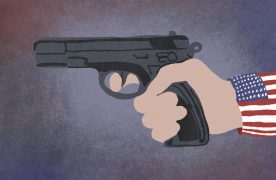Democracy in Burma can only be the result of long-term efforts to mobilize and educate the country’s people, a speaker said on Wednesday.
Harn Yawnghwe discussed the upcoming elections in Burma, now known as Myanmar, and his involvement with Burma’s pro-democracy movement to about 22 people in the Boston University’s School of Law at an event titled “Burma’s Pro-Democracy Movement: Will There be Change 20 Years Later?”
Yawnghwe is the executive director of the Euro-Burma Office, a Southeast Asian non-governmental organization in its 13th year, established to promote democracy in the country.
“We were fortunately able to get him to come here,” said Julia Ong, a School of Law post-graduate student and president of the Asian Pacific American Law Students Association. “He has done phenomenal work.”
Many people do not know much about Burma and why the country is struggling to obtain democracy, Yawnghwe said.
“Few know that Burma is actually a union, made up of seven ethnic states plus Burma, proper,” he said. “We have quite a bit of a problem with the situation in Burma.”
He explained major political parties have emerged in Burma over the years, but none have gained enough power or influence to match the country’s military’s control.
Although the military is in a comfortable, non-threatened situation, it’s holding a general election on Nov. 7, he said.
“We are anxiously waiting to see if there will be any change since 1990 when the last election was held,” Ong said.
Yawnghwe explained that 20 years ago, the National League for Democracy won 80 percent of parliament seats, which normally should have made the party’s candidate in the general election, Aung San Suu Kyi, the country’s prime minister.
However, the military failed to recognize her victory and she was placed under house arrest.
“Everyone knows the elections are being held to legitimize the military,” Yawnghwe said. “They have it in their head that to gain international legitimacy, they must have elections.”
Yawnghwe said that although there is a lack of excitement about the upcoming election, there are still many who are actively working to promote democracy and channel change in Burma.
Some have suggested boycotting the election, he said.
“This will not work,” said Yawnghwe. “If no one votes, the military wins and the opposition will be shot out of politics.”
Yawnghwe said real change in Burma will only result from long-term efforts.
“They have to mobilize and educate the public,” said Yawnghwe. “That’s the basis of democracy. People need to be concerned about themselves.”
According to Yawnghwe, a solution to the tension would be the military’s willingness to negotiate with the various ethnic nationalities.
He ended his discussion on a positive note.
“We have waited 20 years,” he said. “We have to make sure we better get it in the next 20 years.”
Susan Akram, a law professor at BU, said listening to Yawnghwe’s insight was an eye opening experience.
“I have been following the Massachusetts Burma Law for years, and have heard about sanctions in Burma, and how nothing else is going to work, but there’s another story,” Akram said.
This is an account occasionally used by the Daily Free Press editors to post archived posts from previous iterations of the site or otherwise for special circumstance publications. See authorship info on the byline at the top of the page.












